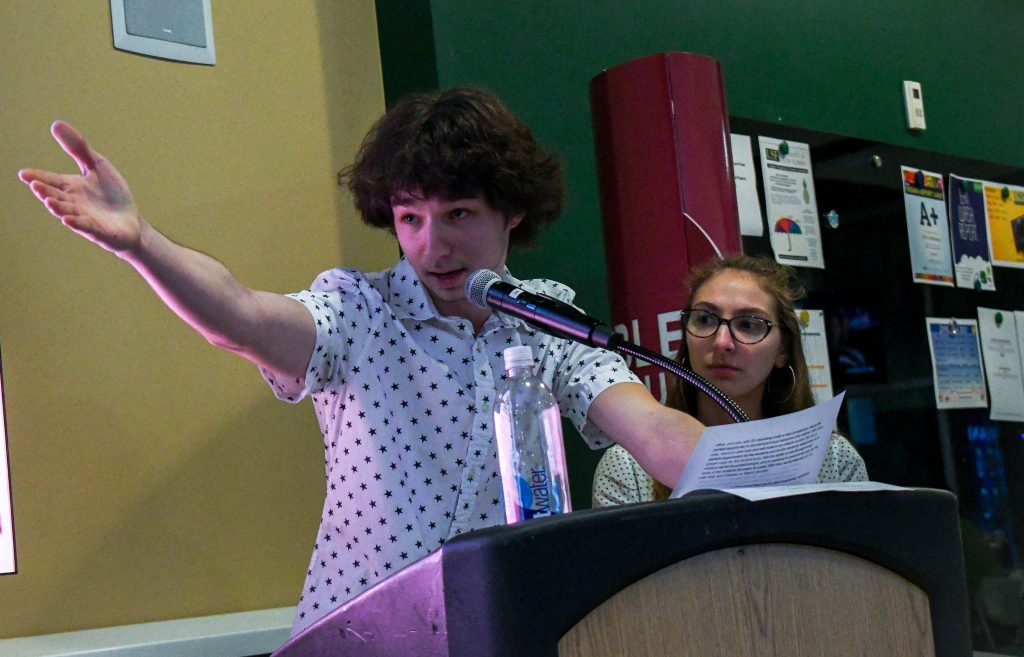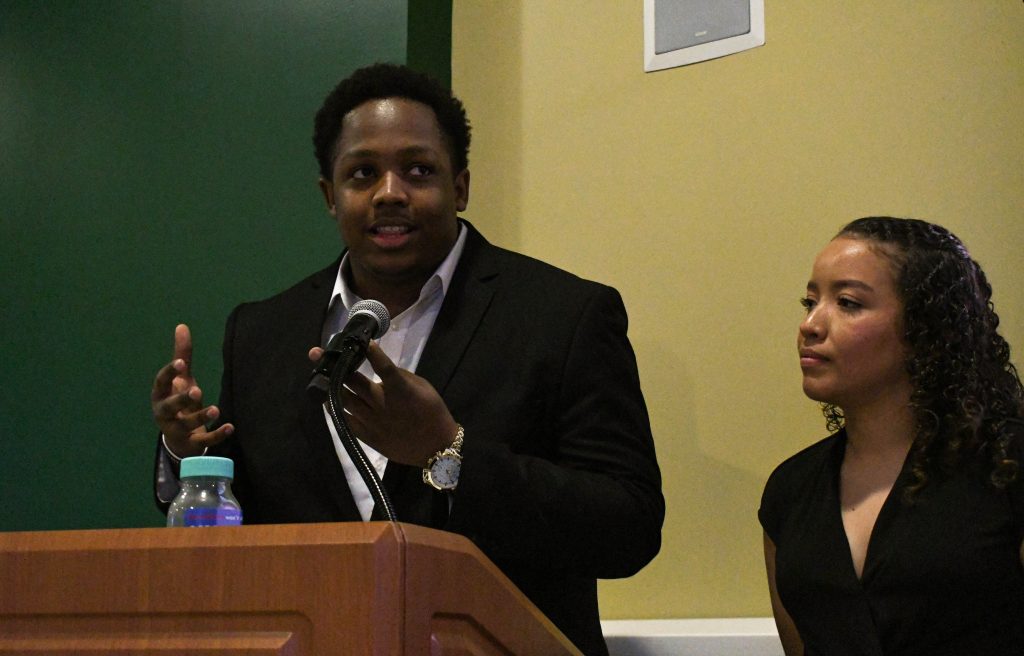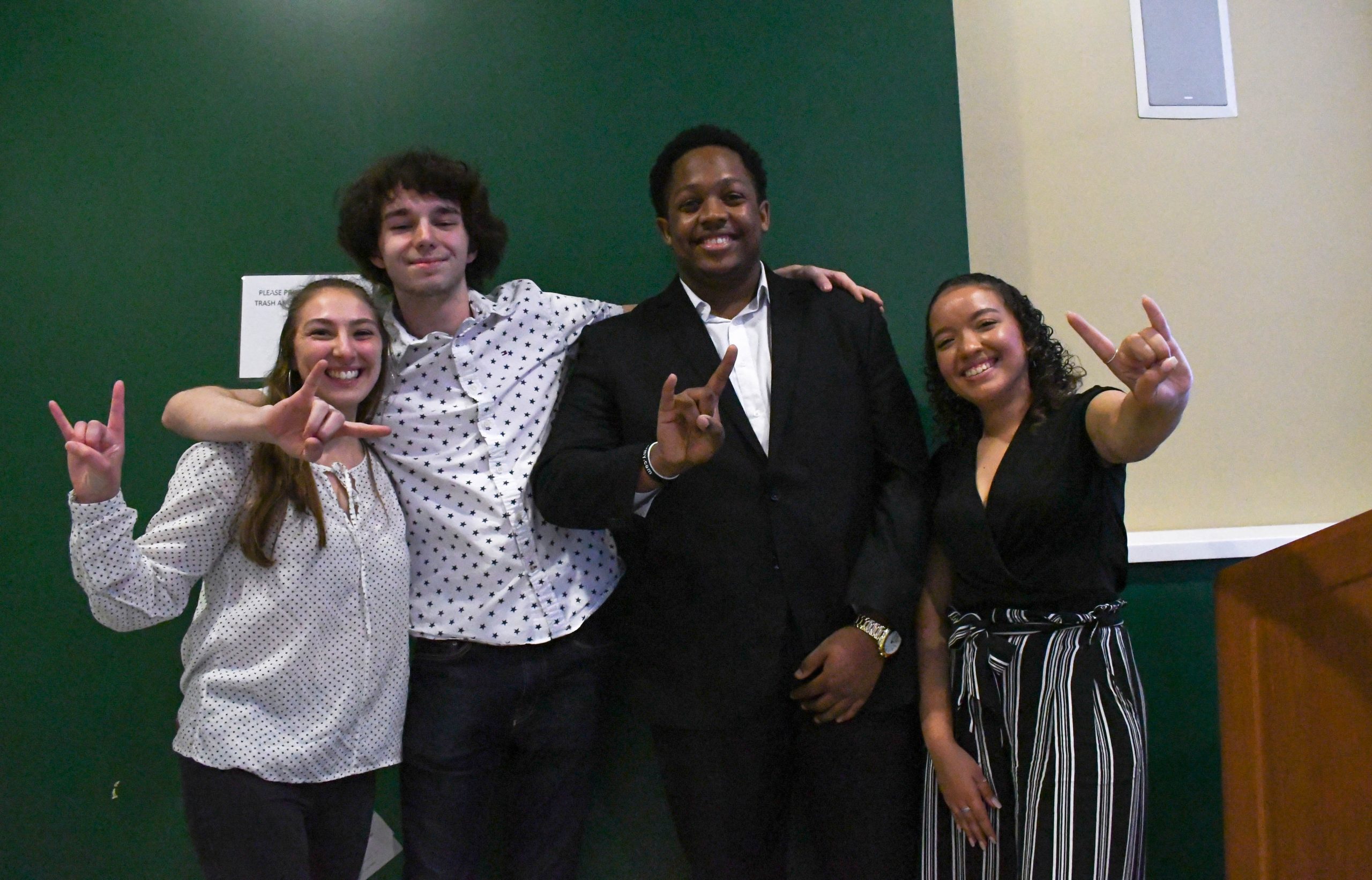Pictured above: (Left to right) Veronica Jimenez, Jonathon Hatzistefanou, Isaiah Castle, Veronica Jimenez. The two starkly different platforms were on display Feb. 18 when the two candidates for campus governor debated before a sparse crowd of about 30 students in The Reef.
Cassidy Schuck | The Crow’s Nest
By Katlynn Mullins
One candidate for the top post in St. Petersburg’s Student Government is a firebrand calling for wholesale change. He’s quick to point out shortcomings in the way things are run and says members of SG should not be paid.
The other candidate is a seasoned member of SG’s executive branch. She advocates sitting down to talk things through and says that students who invest time in SG should be paid something.
The two dramatically different platforms were on display Feb. 18 when the two candidates for campus governor debated before a sparse crowd of about 30 students in The Reef.
Emily Wunderlich and Dylan Hart, the editor-in-chief and managing editor of The Crow’s Nest, moderated from seats between the two podiums.
On the right were the outspoken reformer, Jonathon Hatzistefanou, and his running mate, Veronica Jimenez.
On the left were the more reserved Andrea Campos and her running mate, Isaiah Castle.
Hatzistefanou is a junior from Stuart on Florida’s east coast. He was elected as a senator last fall and said he “understands how (general assembly) is run.”

Cassidy Schuck | The Crow’s Nest
“By understanding the process in which legislation is passed and understanding the basic administrative standards that SG is based on,” he said, he feels prepared to push for changes.
He called for extended library hours during exam time, lower costs for housing and meal plans and less controversy and drama from SG members.
Jimenez, a sophomore who made her way to SG senate president as the result of two resignations, did not speak during the debate.
On the other ticket, Campos, a junior from Puerto Rico, started at the Student Green Energy Fund and has worked on projects like the water bottle refill stations and the ORCA mechanic biodigester project. Now, she’s the director of sustainable initiatives in the executive branch, making $3,060 a year.

Cassidy Schuck | The Crow’s Nest
She stressed a platform built on “three pillars” – sustainability, diversity and increasing the “promotion of the many programs on campus.”
Castle, her running mate, was elected to the senate in the fall. He is a first-year junior who has been invited to join several organizations and is “happy to be here, and can’t wait to keep going as lieutenant governor.”
An awkward time
The election comes at an awkward time for the St. Petersburg campus, which is losing its independent accreditation and consolidating with Sarasota-Manatee and the much larger Tampa campus on July 1.
Although final details are still being ironed out, each of the three USF campuses will have a governor and lieutenant governor – who will essentially replace the current student body presidents and vice presidents; a six-member campus council; and a campus financial officer, campus attorney and campus public defender who are appointed by the governor and confirmed by the council.
Meanwhile, the consolidated university will have a student body president and vice president, and a 60-member senate to preside over all three campuses.
At least initially, St. Petersburg will get nine seats in the senate, with 44 in Tampa and seven in Sarasota-Manatee.
That apparently means a key job of student government – allocating the revenue from student fees to campus organizations – will pass next year to a Tampa-based senate, dominated by Tampa-based students.
Student Government in St. Petersburg has struggled for relevance in recent years. Voting turnout for SG elections has been poor, and SG itself has been marked by controversy and internal disputes.
In 2017, the vice president-elect was expelled from school for allegedly sexually assaulting a female student.
The year before, the SG president and vice president took leaves of absence that were never explained before they resigned six months later. The president later acknowledged that allegations of sexual harassment figured in his leave but said a university investigation cleared him.
Last spring, in a spasm of dysfunction, the SG vice president sent out tweets criticizing “two gay males” in SG, the president abruptly threatened to cut off all funding of The Crow’s Nest, and impeachment charges were brought – unsuccessfully – against the entire supreme court.
Already this year, two senate presidents have resigned.
The candidates’ platforms
Amid the uncertainty over consolidation, the two tickets squared off in the debate with calls for change while preserving what’s best for the St. Petersburg campus.
The candidates each had three minutes for opening statements, and Hatzistefanou and Jimenez went first.
“We’re running because we love this school,” Hatzistefanou said. “We have a platform full of initiatives,” like extended library hours during exams and lower meal plan and housing prices because both are “too damn high.”
“But, frankly, Student Government is not in a position to get all these things done in a timely manner,” he said. “In the past year or so, SG has had a myriad of scandals like impeachment and other drama.”
He didn’t name names because that would’ve been “unbelievably rude,” but promised to be the “voice of students in the face of administration.”
In their opening statements, Campos and Castle stressed the importance of diversity and building on current campus programs.
“I need more representation on this campus,” said Campos, whose first language is Spanish. “We need more people from Asian backgrounds and more African Americans. People, to feel welcome at this campus, need to see people who are like them, and, sadly, I don’t see enough people that are like me.”
She’s made friends from other backgrounds, but she believes it’s nice to see a campus as “diverse as the city of St. Pete.”
Consolidation and voter turnout
Both tickets were asked if they have a good understanding of consolidation and how it may affect the St. Petersburg campus.
“Yes, I do have a good understanding of consolidation.” Hatzistefanou said. It was ordered by the Legislature in “11 lines of text” in 2018, “so now instead of three campuses with independent accreditation, we’ll have one USF system that has one formal accreditation.”
Hatzistefanou said this means Tampa will have “majority control over all programs.” He stressed the importance of a “loud and vocal voice” that would “no doubt keep Tampa at bay.”
He also proposed an “interbranch transparency commission,” which would set up direct communications between the three campuses to “ensure every voice is heard.”
Then it was Campos’ turn.
“I’d like to thank Senator Hatz for laying out the facts so I don’t have to repeat the same thing,” Campos said.
“We must keep in mind that it is very much a process of becoming something. It is not set in stone yet…” she said. “It is very important for us to have an understanding of consolidation and be able to use that information to set the precedent of what our campus deserves and what the students want.”
Both tickets agree that St. Petersburg needs to remain as independent as possible, but the ways they plan to assert that differ.
“University SG’s are meant to be voices for the students in the face of administration… but currently, it is not that,” said Hatzistefanou. “Veronica and I pledge — no, we guarantee — that we will make SG an effective body to voice the interests of the students.”
Campos took a leaner approach.
“We need to unite as a front and make sure that Tampa and Sarasota-Manatee, under a consolidated Student Government, know that we are here to stay, and that our voice is just as important,” Campos said.
“When we come in fighting with fire, they’re not going to want to sit and have a conversation with us,” she said. “What you guys need is leadership and a governor and lieutenant governor that will come in with a strong voice.
“Just as we’re trying to keep our identity,” Campos said, “We need to be understanding of what the three separate campuses bring to the table.”
Voter turnout
The candidates addressed multiple questions on the reasons for USF St. Petersburg’s low voter turnout.
According to Hatzistefanou, there is “no reason to vote.”
“SG is not respected by the students because of impeachment scandals, because of high turnover rates in senate leadership and executive leadership.”
Having an effective SG free of these scandals, Hatzistefanou said, and perhaps offering free food or T-shirts at voting booths, might help increase turnout.
Campos placed the blame on St. Petersburg’s commuter culture.
“Student engagement starts with your everyday life here,” Campos said. “A lot of students have one class a day… We need to create incentives for students to stay here longer.”
She proposed larger green spaces and extended library hours on the weekends.
“When we have engaged students,” Campos said, “We will have students that want to become involved in student organizations (like Student Government).”
Vision
“What is your vision for this campus as a branch of one consolidated university?” the candidates were asked.
Castle’s is diversity.
“As one of the five African American first-year students here,” Castle said. “I can attest that the school is filled with open-minded people… but I would love to improve the diversity and inclusion we have on this campus.”
Campos, as a bilingual Puerto Rican native, holds a similar belief.
Hatzistefanou’s is preserving St. Petersburg’s “uniqueness.”
“I know for a fact that we can preserve its uniqueness… and the culture we all know on this campus,” he said.
Transparency
With last spring’s impeachments and resignations in mind, SG’s future was also a topic — and so was the budget.
Last spring, SG approved a budget for 2019-2020 that increased its own allocation by 19 percent while slashing the appropriations for other campus organizations.
It allocated more than $70,000 to pay salaries to 22 members of SG, including $10,968.75 for student body president and $8,325 for the vice president.
When Hatzistefanou joined SG, he said, he wasn’t aware that members received salaries.
“This was kind of a shock to me seeing that SG is a voluntary position.
“Personally, and I don’t think SG is going to like it when I say this,” Hatzistefanou said, “I don’t think we should receive a salary.”
That earned some whispers from spectators.
Campos, who gets paid for her position in the executive branch, said she favors paying salaries but believes they should be lower.
“Although this is a voluntary position… our time is worth something,” Campos said. “Students who are this involved with Student Government should be rewarded in some way shape or form, whether that comes as a stipend or a salary.”
Up next, the candidates were asked how they would address various problems that might come up. How would they deal with a high turnover rate in SG, and senate members afraid to vote against their friends?
“When we have student leaders that actually want to change the school for the better, they will not be taken aback by petty situations,” Campos said. “We are not here to have personal agendas, and we are not here to have our personal agendas affect our work.”
Though Campos said SG is past the problem, Hatzistefanou disagrees.
“This is precisely why I’m running,” he said.
“When you have people like me and Veronica who can actually identify that this is a problem that needs to be changed… that means confronting these people and telling them straight up, ‘Either change your intentions, change your motivations or leave Student Government,’” Hatzistefanou said. “Student Government will become more effective.
“We will address this. We will make sure people aren’t afraid to use their no vote.”
By encouraging debate and dissent, Hatzistefanou said, the stigma against using the no vote would be “destroyed.”
Campos said some of the same.
A senator’s “personal experiences should not be a protocol that stands in front of the Student Government,” Campos said.
“It is very important that we make sure the people coming into Student Government take their personal agendas aside and have a clear voice in what they will do.
“It is important that you feel that your vote is your voice and the students’ voice. Not your friend’s voice.”
SG elections will be held on March 2-5. Students can vote online or in person. Voting tables will be set up in the USC and the library from 9 a.m. – 5 p.m. on all three days.
The Student Government constitution, which lays out the organization and responsibilities of SG once consolidation takes effect July 1, can be found here.
On the ballot March 2-5
When the three campuses of USF are consolidated into one on July 1, Student Government will be led by a president and vice president and a 60-member senate (with 44 members from Tampa, nine from St. Petersburg and seven from Sarasota-Manatee).
There are four presidential candidates in the student election March 2-5.
One ticket is from St. Petersburg – Trevor Martindale and running mate Darnell Henderson. The other three tickets are from Tampa.
According to The Oracle, the Tampa campus newspaper, they are: Yusuf Fattah and Claire Mitchell; siblings Kuchari and Hyelampa Thlala Kolo; and Guy Dayhoff and Peter Radulovic. But Dayhoff has dropped out, The Oracle reported Feb. 20.
Meanwhile, each of the three campuses will elect a governor and lieutenant governor and a campus council with six members. Each campus also will have a deputy financial officer, deputy attorney and deputy public defender who are appointed by the governor and confirmed by the council.
There are two candidates for St. Petersburg governor: Jonathon Hatzistefanou (and running mate Veronica Jimenez) and Andrea Rodriguez Campos (and running mate Isaiah Castle).
Only one student qualified to run for the St. Petersburg campus council and only six qualified to run for the system-wide senate. So there will be a special election this summer to fill the vacancies.
In the March election, students can vote online or in person. Tables will be set up in the USC and library from 9 a.m. to 5 p.m. on all three days.
This story was updated on Feb. 24, 2020, to correct the spelling of Jonathon Hatzistefanou’s first name.



